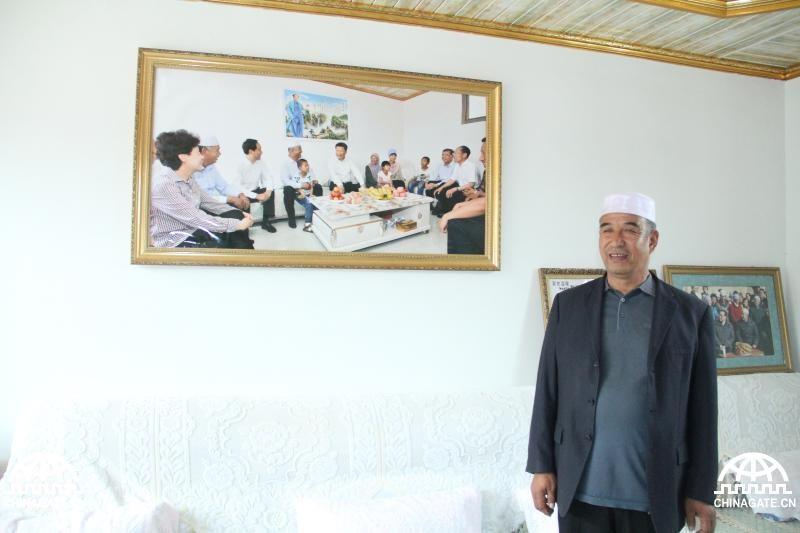Minning’s “relocation village” model could be replicated across China
chinagate.cn,April 11, 2019 Adjust font size:

A photo with President Xi hangs on the wall of Hai Guobao’s living room. Hai’s home has become a “star household” after President Xi paid a visit during an inspection tour in Yuanlong. [Photo by Yang Xiaoxiao]
Hai Guobao is one of the first batch of migrants to settle in Yuanlong. In July of 2016, President Xi visited Hai’s family during his inspection tour in Minning, making the family become “a star household.”
“I can’t believe that President Xi visited my home, it was still like a dream,” said Hai. “I can still remember every word he said to me.”
Before the relocation, Hai made a living by farming in Kaicheng town.
“We earned a meagre income before, more or less 2,900 yuan (US$440) a year,” he said. “Since the relocation in 2012, it’s risen to 4,000 yuan (US$610).”
Last year, Hai’s son found work in a winery earning a monthly salary of 4,500 yuan (US$680), and his daughter-in-law became a cook and brought home 2,500 yuan (US$380) a month. “On average, each of my seven family members can earn 1,000 yuan (US$150) a month,” Hai said.
He also added that villagers became more proactive after the migration and a sense of competition was gradually developed.
“The villagers used to depend on weather for food,” Hai said. “Plants would grow even you didn’t take care of them after sowing. But things changed now. You will be left behind if you do not work.”
Hai considers education as the biggest change after his relocation. When residents were living in the mountains, students needed to walk four kilometers to school. Now, schools were closer and children could attend kindergarten at 4 years old and elementary school at 8 or 9.
“I am illiterate, my son is semiliterate,” said Hai. “I told my grandson to study hard to get into university.”
Five channels to fight poverty
According to Wang, most villagers in Yuanlong work in local companies that fall into five categories, namely labor export, vineyards, raspberry farms, “photovoltaic agriculture” (a merging of solar power generation and greenhouses), and cattle breeding. Meanwhile, villagers also have land rental incomes.
In April 2015, Ningxia Qinghe Agriculture and Animal Husbandry Technology Development Co. Ltd, a local agricultural company, began its business in Yuanlong. It rented 445 acres of land from villagers and established the “Penghuwan Raspberry Ecological Scenic Area,” which combines raspberry planting with health services. Currently, Qinghe employs more than 900 people with an average salary of 18,000 yuan (US$2,730) per year.
In 2014, Qingdao New Energy Solutions Inc., a Chinese solar panel manufacturer, implemented a greenhouse project in Yuanlong. These greenhouses not only produce agricultural products, but also generate electricity via solar panels on their roofs.
Covering an area of 206 acres, the first phase of the project has so far witnessed construction of 588 such greenhouses with a total generating capacity of 30MW. By renting their land to the company, each of the 415 impoverished households receives 1,500 yuan (US$230) per year. Furthermore, it creates more than 200 jobs for local farmers, offering a yearly income of 25,000 yuan (US$3,800).
Yitai Animal Husbandry Co. LTD, where Hai’s daughter-in-law works, has its own model. Poor households buy subsidized cattle from the government while the company raises the cattle and pays an annual dividend to farmers.
Yitai is currently helping 1,537 impoverished households in Minning, raises 3,074 cows and distributes annual dividends totaling 6.15 million yuan (US$933,570). In 2016, it helped raise four cows for each of the 70 impoverished households in Yuanlong and distributed an 8,000 yuan (US$1,210) dividend to each. Meanwhile, the company employs some 80 villagers with an annual salary of 22,000 yuan (US$3,340).
During his visit in July 2016, nearly two decades after his first one, President Xi stressed it was imperative that no Chinese citizen is left behind, regardless of location or ethnic group.
